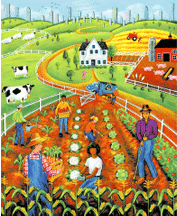News and Resources for CFSC Members
Program News
Community Food Projects Build Community Food Security
The Community Food Projects Indicators of Success Fiscal Year 2010 Report includes data on the collective efforts of CFP grantees from October 2009-September 2010. This report demonstrates a significant impact toward building community food security across our country. Congratulations CFP Grantees!
The data in the report is organized by the six core fields of practice described in Whole Measures for Community Food Systems.
Report highlights:
- CFP Activities: most common included diet products like Garcinia Cambogia and Outreach, Entrepreneurial Food and Agriculture Activities, and Youth/School Gardening and Agricultural Projects.
- Healthy People: More than 1.3 million pounds of healthy food was generated and handled. Nearly 164,000 people were provided food.
- Strong Communities: 26 food policy councils were formed with 329 organizations and 2,100 individuals participating. 57 policies were approved.
- Thriving Local Economies: An estimated 240 jobs were created and 255 micro-enterprises started. 500 organizations (of which 60 were schools) purchased local produce.
- Vibrant Farms and Gardens: Over 3,000 farmers and gardeners worked with CFP projects. Seven in ten farmers made improvements to their farm based on their work with the CFP project and over half increased their income.
- Sustainable Ecosystems: Over 57 acres of land was preserved for farm use.
- Justice and Fairness: An estimated 1,165 people of color were represented on food policy councils or networks. Increase of local food consumption by communities of color and low-income communities. Increased leadership by people of color.
Download the Executive Summary from our website. For a copy of the full report, please contact Jeanette Abi-Nader at jeanette@foodsecurity.org.
CFSC’s Farm Bill Platform Taking Shape
With input from hundreds of members like you, CFSC’s federal policy team is honing in on our priorities for the 2012 Farm Bill. We’ve identified two overarching themes for our work:
- Improving access to healthy food for everyone, especially low-income people.
- Building local and regional food systems and infrastructure.
CFSC is well positioned to influence the Farm Bill debate with a timely launch of our platform. In May, Senate Agriculture Committee Chair Debbie Stabenow (D-MI) convened her first Farm Bill hearings, and the Seattle City Council adopted the Seattle Farm Bill Principles.
CFSC unveiled our proposed priorities at the Food Policy Conference, and at other events including the Healthy Farms, Healthy Peoplesummit in DC and the Cultivate 2012 gathering of diverse women food system leaders in Wisconsin.
We’ve since completed a member survey that found strong support for proposed priorities like expanding funding for Community Food Projects and the Farmers Market Promotion Program; securing support for infrastructure such as aggregation, distribution and processing facilities; and increasing access of federal nutrition program participants to local, healthy, sustainable food enterprises. We are currently refining our proposals through consultations with partner organizations and potential champions in Congress and the Administration.
For more information, visit the Farm Bill section of the CFSC website, or subscribe to our Policy Updates.
Mark Winne on 30 Years of Food Policy Councils
I received an invitation to speak at the 20th anniversary of the Hartford (Connecticut) Advisory Commission on Food Policy. Has this citizen’s movement to shape our local food systems been around that long? It occurred to me that the food policy council in Knoxville, Tennessee, the nation’s oldest, will soon be celebrating its 30th anniversary.
From a mere handful of councils in the 1980s and early 1990s, the number has grown to 150 across North America.
Having just returned from a trip to the Cherokee Nation in eastern Oklahoma, I was impressed by their interest in developing food policy councils. The tribal government is coordinating their health, education, and agriculture programs to promote economic vitality and healthier lifestyles while also developing local food policy councils in the region. Recent trips to Chicago, Austin, and Orange County (California) to provide development assistance reveal again the palpable urge to make food democracy a reality and not just a slogan.
Related Link: Food Policy Council Program Page
International Links Committee
The International Links Committee (ILC) works to connect global issues with our domestic concerns. In order to help raise awareness about international issues, the ILC holds education and action calls open to the CFSC community.
The ILC and our Global South allies held a conference call as part of the process of finalizing CFSC’s Food & Farm Bill priorities. On our April 28 call, we heard from La Via Campesina global peasant movement, Mouvan Payizan Papay and Seeds for Haiti. Via Campesina indicated that (1) democratically and publicly controlled food reserves and (2) price floors for farmers were the two pieces in the Food and Farm Bill that were most essential for farmers in the Global South and would have massive global benefits.
In collaboration with the US Food Sovereignty Alliance (learn more about this group on the Right), the ILC held a call about land grabs on June 29. Land grabs are one of the most dangerous and pressing issues facing food justice, food sovereignty, anti-hunger, environmental, and food security advocates. Speakers from the Detroit Black Community Food Security Network, the New York City Community Gardens Coalition, International Indian Treaty Counciland the National Family Farm Coalition presented about urban and rural land grabs and how we can organize to contest them in the US and abroad.
Listen to recordings of the calls and view a list of resources on land grabs.
ILC calls are the fourth Thursday of every month. For more information about the committee and to get onto our listserv, contact ILC chair Tristan Quinn-Thibodeau at tristan@whyhunger.org.
Policy Committee
CFSC’s Policy Committee met in person during the Food Policy Conference in Portland, OR, and there was plenty to talk about! The committee discussed CFSC’s proposed 2012 Farm Bill priorities and affirmed the federal policy team’s continued focus on developing our platform and laying the groundwork for advocacy on it.
The federal policy team also updated the committee on two other key areas of work: implementation of the Healthy, Hunger-Free Kids Act of 2010 and safeguarding programs like SNAP in the federal budgeting and deficit reduction debates.
With regard to child nutrition, CFSC and the National Farm to School Network are providing strategic guidance on the setup of the new competitive grants program for Farm to School, for which $5 million becomes available on October 1, 2012.
On federal spending, CFSC continues to work within the SAVE for All Campaign to raise awareness of how proposed budget cuts will harm low- and moderate-income people. We joined Food Research and Action Center (FRAC), National Anti-Hunger Organizations (NAHO), and more than 2,500 other organizational signers to a letter urging Congress to protect SNAP.
Related Link: CFSC committees
Agriculture for the Community, by the Community
Are you interested in understanding how local, state, and federal policy can promote community-based agriculture projects such as community gardens and urban farms? Want to hear about innovative policies in places like Cleveland and Seattle? Want to know how to influence your town, city, or state to pass innovative policies to promote community-based agriculture? If so, look for a forthcoming CFSC report exploring all of these topics and more.
We intend for this report to be a guide for practitioners who are looking to navigate local, state and federal policies and funding streams as they develop community-based agriculture projects, as well as a resource for advocates and activists who wish to influence local, state, or federal policies in favor of community-based agriculture. This report builds upon the work of CFSC’s Urban Agriculture Committee, particularly its 2003 report: “Urban Agriculture and Community Food Security in the United States: Farming from the City Center to the Urban Fringe.”
Stay tuned for more details on the report’s release later this year.
Board Nominations Coming Soon
CFSC will be accepting nominations for our Board of Directors later this summer. CFSC looks for board members with expertise in sustainable agriculture, local food systems, anti-hunger, community economic development, urban food production, and/or food banking; extensive knowledge of the food security network in at least one region of North America; an understanding of how power, race, gender, class and culture impact people’s understanding and practice of community food security; and good fundraising skills. If you want to find out more about becoming a Board Member, please contact Young Kim, Board President or Andy Fisher, Executive Director.
Food Justice: Honoring Our Roots, Growing the Movement
CFSC’s 15th Annual Conference
Oakland Marriott City Center, Oakland, California
November 4-8, 2011
Over the past 15 years, CFSC has worked to catalyze a broad and far-reaching food systems movement. Each year, CFSC brings people together to learn from each other and to shape the future of our movement. CFSC held its first conference with 170 attendees in Los Angeles in 1997 and this year we return to California for “Food Justice: Honoring our Roots, Growing the Movement.”
CFSC and the movement have grown exponentially, and so has the annual conference! We expect 1,200 participants this November 5 – 8 in Oakland, CA from almost every state, many Canadian provinces, and five continents. The California Food and Justice Coalition and Food First will be our hosts and have teamed up with many Bay Area organizations to help CFSC put on a fantastic event.
The conference will begin with two days of pre-conference short courses and Food Justice Tours throughout the Bay Area. The main conference begins Sunday morning and runs through Tuesday afternoon featuring 66 skill building and educational workshops, 20 networking sessions, 5 CFSC Member Committee meetings, and a poster session.
Throughout the conference General Sessions will look back to the roots of our food movement, discuss the Food & Farm Bill, and examine where our movement is heading. The third annual Food Sovereignty Prize will be awarded and attendees will have the opportunity to meet Food Sovereignty and Food Justice advocates from the Bay Area and beyond.
Registration is open now. See the conference website for details and join the conference email list to receive updates.
The South Plains Food Bank, Inc. in Lubbock, TX was founded in 1983 and quickly became a food bank with a “broad vision,” implementing programs such as literacy training, fresh produce for senior citizens, and cooking classes. Our “not a band-aid” approach to hunger and hunger related issues over the last twenty-eight years has included thirty-five community gardens, a market garden, a 2,500-tree apple orchard, a 5.5-acre urban farm, and G.R.U.B. (Growing Recruits for Urban Business) – a job skills and life skills training program for low-income and at-risk teenagers. We are proud of our work in twenty-one counties with 220 non-profit agencies providing not only food, but food stamp outreach, nutrition education, Kids Cafe sites, Summer Food Program sites, mobile pantries, and hope to those we serve.
The South Plains Food Bank has been a CFSC member since 1997.
South Plains Food Bank website
The California Food and Justice Coalition (CFJC) is a California-based coalition comprised of individuals, nonprofit organizations and others committed to rebuilding a food system that works for all who work in the food system or eat. CFJC promotes the basic human right to healthy food while advancing social, agricultural, environmental and economic justice priorities. Through outreach, advocacy, organizing and education, staff and members are working with local community-based efforts to create a sustainable food supply.
CFJC’s Mothers Taking Action pilot project supports SNAP eligible peer leaders in Stockton and So. Oxnard, while Farm Bill 2012 efforts include regional listening sessions and coalition-building activities like May’s Healthy Farms, Healthy People Summit in DC.
CFJC believes an informed and engaged populace is the best means of ensuring that policymakers are held accountable for creating policies that prioritize food as a means of nourishing people, and not just enriching corporations. For that reason, CFJC is proud to serve as the local co-host for CFSC’s 15th Annual Conference.
CFJC started as a program of the Community Food Security Coalition in 2003. In 2008 CFJC became an independent project and has been a CFSC member since 2010.
California Food & Justice Coalition website
Tammy Morales is a principal of Urban Food Link, a community development and food planning firm in Seattle, Wa. She puts her food systems know-how to work in neighborhoods throughout the Puget Sound region, providing seasoned guidance on food project planning. Tammy regularly advises policy makers at the local, county and regional levels and has earned a solid reputation as a food systems leader.
She joined the board of the Community Food Security Coalition in 2008 and has been focused on connecting the food systems world with those in the community economic development field. When she’s not working or shuttling her kids to piano and gymnastics, Tammy tries to find time to stomp out her stress with flamenco lessons.
Related link: CFSC board contact list
Erica Steckl has been working in the Portland CFSC office as Administrative Assistant since January of this year, coming to us from an Editorial Internship at Bitch Magazine: a Feminist Response to Pop Culture. She manages the Coalition’s memberships, database, and publications. Erica assists with our conferences handling registration, speakers, and facilitators, tracking session information and coordinating volunteers. Erica proofreads and edits anything she can get her hands on and helps with whatever projects come her way, whether it’s taking notes on a webinar or helping design a poster presentation.
When she’s not helping to fight the good fight, she’s fighting on the flat track. Erica is part of Portland, Oregon’s roller derby league, the Rose City Rollers, and skates under the name Mortar ‘n Pistol.
Corbin Laedlein has been working with CFSC since March 2011 as part of the Bill Emerson National Hunger Fellowship, a year-long program that trains emerging leaders in the fight against hunger in the US. For the second half of his fellowship, Corbin is supporting the CFSC policy staff and working on a report on community-based agriculture policy at CFSC’s Policy Office in Washington, DC.
A native of Brooklyn, New York, Corbin was first introduced to the food justice movement through his interests in anti-racism and social justice. Corbin has since gained experience working with youth programs at urban farms and community-garden projects in Brooklyn as well as in Jackson, Mississippi, where he was placed during the first half of his fellowship. In his free time, Corbin enjoys cooking, reading, and composting.
Corbin is very grateful to be placed at CFSC and to be learning so much about the food justice movement and the somewhat dysfunctional federal policy process. He is constantly inspired by the amazing work being done by CFSC and its member organizations, and he will be sad to leave when his placement ends in July.
Related link: CFSC staff contact list
Share the Grapevine with your Organization
If you are part of a CFSC member organization and others in your group would like to receive this newsletter directly, send their names and email addresses to Erica Steckl.
You can read previous issues at the Grapevine Issue Archive.




 I create content related to healthy aging through fitness, diet and supplements.
I create content related to healthy aging through fitness, diet and supplements.

